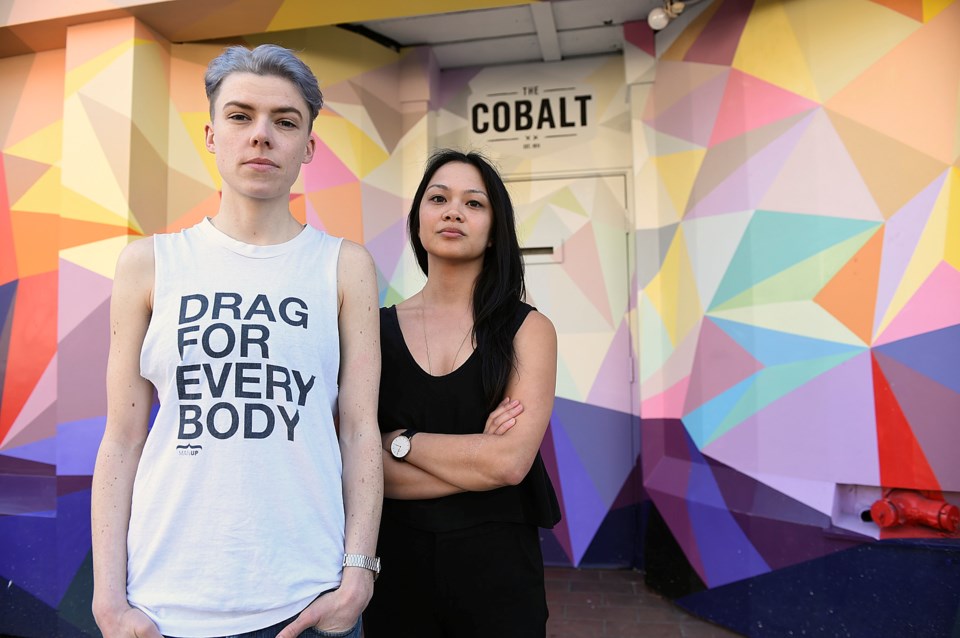There is a profound lack of spaces in Vancouver for queer women and femmes. In fact, Vancouver’s last permanent lesbian bar, Lick, closed its doors in 2011. Meanwhile, misogyny, both within the scene and outside of it, presents a constant challenge to the progress and inclusiveness of the LGBTQ+ community.
Yet the scene in Vancouver is more alive than ever, with roaming parties – parties that take over local host spaces each month – aiming to fight misogyny and represent the variety of people in queer communities.
These roaming parties – run by, and created for, queer folk (specifically women, trans people and QTPOC) – have taken over in the vacuum left behind by bars like Lick, and actually created a more diverse queer scene than ever before, with events such as Man Up, Denim Vest, Open Relationships and Lick Reunited contributing to the creation of safe spaces for a diversity of queer people in Vancouver.
Paige Frewer, who hosts Man Up – a monthly queer dance party/drag show held at the Cobalt on Main Street – said the event has evolved into a place for feminine performance, and representation of all members of the queer community.
“The community had a desire of representation for femmes,” they said. “We represent ourselves as being a genderfluid, women and femme-posi queer performance space.”
Frewer said that gentrification, income disparity for women and trans folks compared to men, and lack of support makes it challenging to run any space in the city, let alone a queer, femme-positive space.
They also believe the evolution of LGBTQ+ people being more accepted by the community at large has changed queer party spaces, and that commercial demand isn’t there to sustain a permanent lesbian venue in such an expensive city.
“Ten, 20 years ago, gay bars and queer spaces were havens and critical gathering places. That’s still a reality, but with the sort of bounds being made in the queer community, the boundaries of lesbian and dyke culture becomes sort of blurry as gender and diversity is more understood,” they said. “There isn’t that clear line between gay and straight anymore, so there aren’t so [many] bars for gay people and bars for straight people.”
Frewer also believes that it can be difficult for queer- and queer women-run spaces to stay open, as they are often politically charged.
“In general, queer people are still marginalized, but as we become more and more accepted in society, there is still a disproportionate marginalization of femme queer people and trans people,” Frewer said. “I think that it’s important to have spaces that are specifically focused on those identities, and giving performance spaces, paid work and outlets for these folks.”
Melanie Matining is a Vancouver planning commissioner and co-founder of monthly queer party Denim Vest, with Emily Groundwater. Matining says visibility for queer women, femmes, and trans people in Vancouver is increasing, which historically hasn’t been the case in LGBTQ+ communities.
“I think there’s a lot of inherent misogyny that exists within queer communities, despite the fact that we’re all trying to work towards social justice and anti-oppression,” Matining said. “There definitely is replication of some of the violences that we’re trying to fight against.”
One of the reasons Matining and Groundwater started Denim Vest was because they wanted to create a space where everyone could feel comfortable. “It was hard for us to find a space where we felt we wouldn’t get groped, or people would come up to us or say something misogynistic, racist, or femme-phobic. So we were like, let’s open up our own party and have it be centred around ways to create safe spaces for femmes, people with disability, indigenous folk, and gender-nonconforming folks.”
Matining, and the group of people she works with, are trying to find ways to talk about accountability when different forms of violence happen, including misogyny. She also believes that people need to come together to talk about how we can make spaces more accessible in the future.
Matining said there needs to be more communication and relationship building between people both within and outside of the queer community in order to achieve accessibility and cohesiveness.
“We need to de-isolate,” she said. “Sometimes in queer communities, we can really stay in our bubbles. But there’s a lot of strength in trying to create more relationships with people outside of your [comfort zone].”
• The Pink Pages are a monthly LGBTQ+ forum, brought to you by members of the LOUD Business Network. Have an LGBTQ+ event or story idea for the Pink Pages? Email [email protected]



